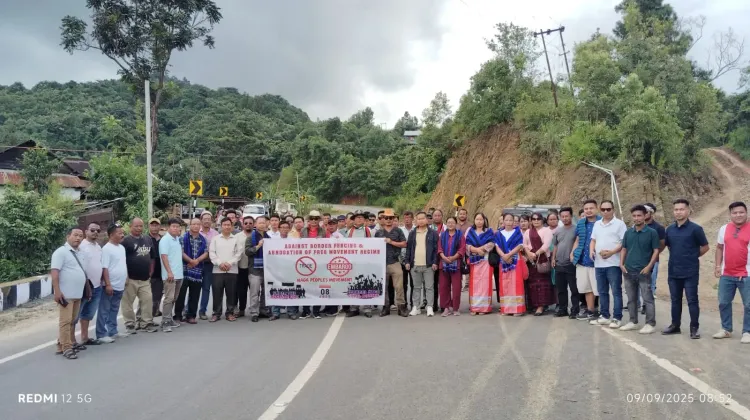Will the Manipur Government's Plea to the Naga Apex Body for Lifting the 'Trade Embargo' Be Heeded?

Synopsis
Key Takeaways
- Manipur government requests UNC to lift embargo
- Trade Embargo impacts supply chains in Naga areas
- Dialogue between government and UNC ongoing
- Concerns about cultural identity raised by Naga groups
- Border fencing decision leads to protests
Imphal, Sep 11 (NationPress) The government of Manipur has formally urged the United Naga Council (UNC), the leading organization representing the Naga community in the state, to reconsider and lift the ongoing indefinite 'Trade Embargo' imposed along the national highways in Naga-dominated regions, as stated by officials on Thursday.
The Trade Embargo was enacted by the UNC and other Naga groups starting from midnight on September 8, in response to the fencing activities along the India-Myanmar international border and the discontinuation of the Free Movement Regime (FMR).
A senior official from Imphal noted that numerous goods-laden and empty trucks, in addition to tankers carrying transport fuel, are currently stranded at various points along the Imphal-Jiribam National Highway (NH-37) and the Imphal-Dimapur National Highway (NH-2).
The Manipur Chief Secretary, Puneet Kumar Goel, communicated in a letter to UNC President Ng. Lorho requesting the withdrawal of their protests, emphasizing the larger public interest at stake, while the Ministry of Home Affairs (MHA) continues dialogues with Naga representatives.
In the correspondence, the Chief Secretary stated: “The MHA has been actively engaging with the UNC regarding the border fencing in Naga-inhabited regions. The state government has acknowledged your memoranda and representations on this matter.”
“It is important to convey that the Central government has acknowledged the concerns expressed by the UNC and other involved parties. Consequently, dialogues will persist with the UNC and other stakeholders before any fencing operations are initiated. The next tripartite meeting with the UNC is anticipated to occur at a mutually agreed date and location,” the letter elaborated.
Meanwhile, MHA officials and leaders from three Naga organizations in Manipur convened an inconclusive meeting in Delhi on August 26 to address demands for the reinstatement of the former FMR and cessation of the ongoing fencing along the India-Myanmar border.
The MHA delegation was led by A.K. Mishra, the advisor on Northeast Affairs, while the Naga delegation, consisting of 11 members, was headed by UNC President Ng. Lorho, including representatives from the UNC, the All Naga Students' Association, Manipur (ANSAM), and the Naga Women's Union (NWU).
Previously, the UNC issued an ultimatum to the Central government and held discussions with Manipur Governor Ajay Kumar Bhalla on August 16, focusing on reinstating the old FMR and halting the border fencing along 398 km of the India-Myanmar border.
Since the commencement of the Trade Embargo, the supply of essential goods and food items to this northeastern state has been severely disrupted.
Essential supply chains have been affected across various regions of the state, impacting both the Imphal Valley and the southern Kuki-dominated hill districts.
Areas such as Senapati, Ukhrul, and Tamenglong have been notably impacted, with trucks laden with essential supplies remaining stuck at multiple checkpoints.
Naga organizations argue that the government's decision to fence the border and abolish the FMR would result in the physical division of Naga tribes spanning Manipur, Nagaland, Arunachal Pradesh, and Myanmar, jeopardizing their cultural identity and ancestral connections.
Last year, the MHA announced the cancellation of the FMR, which previously allowed residents near the India-Myanmar border to travel up to 16 km into each other’s territories without passport and visa requirements. Instead, a new scheme to issue passes to border residents living within 10 km on either side of the border has been proposed to manage cross-border movements.
Governments in Nagaland and Mizoram, alongside numerous political parties and civil societies in these northeastern states, have vocally opposed both the border fencing and the abolition of the previous FMR.
The northeastern states of Arunachal Pradesh, Manipur, Nagaland, and Mizoram collectively share a 1,643-km unfenced border with Myanmar. The MHA had previously committed to erecting fencing along the entire porous border, recognized for the smuggling of arms, ammunition, narcotics, and other contraband, at an estimated cost of Rs 31,000 crore.










